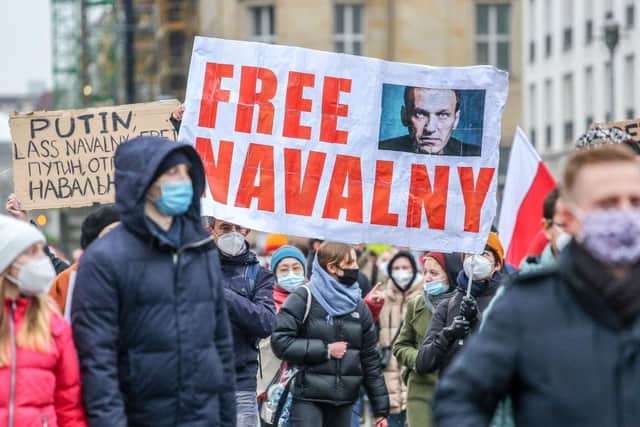Alexei Navalny: who is Russia's opposition leader, why was he jailed and what are people protesting against?
This article contains affiliate links. We may earn a small commission on items purchased through this article, but that does not affect our editorial judgement.
Thousands of people took to the streets of Russia to voice their support of Alexei Navalny, after the opposition leader was jailed on 2 February 2021.
Nearly 1,400 people were detained in Moscow, St Petersburg and smaller cities across Russia, according to the country's OVD-Info human rights monitors.
Advertisement
Hide AdAdvertisement
Hide AdIt follows two days of protests in January, which saw thousands more arrested - including Mr Navalny's wife, demanding his release from detention.


It's been anything but quiet in Russia since Mr Navalny returned to Moscow in January for the first time after being poisoned with a military-grade nerve agent in August.
Who is Alexei Navalny?
Mr Navalny is a long-time critic of the Kremlin and has been described as "the man Vladimir Putin fears the most" by The Wall Street Journal.
A trained lawyer, Mr Navalny received a scholarship to the Yale World Fellows program at Yale University in 2010, and has since entered the world of politics.
He rose to international prominence by organising demonstrations and calling for reforms against alleged corruption in Russia, president Putin and Putin's government.
He is the leader of the Russia of the Future party and founder of the Anti-Corruption Foundation (FBK) and has more than six million YouTube subscribers and two million Twitter followers.
Mr Putin avoids directly referring to Mr Navalny by name and state-run media depicts him as an unimportant blogger.
Why has Alexei Navalny been jailed?
Mr Navalny has received two suspended sentences for embezzlement in July 2013 and December 2014 - both of which his supporters say were politically motivated to prevent him from running in future elections.
Advertisement
Hide AdAdvertisement
Hide AdThis was the case in 2016 when Russia's Central Electoral Commission and Supreme Court of Russia barred him from running due to his prior criminal convictions.
His arrest on 17 January 2021 followed Mr Navalny's return to Russia after he was hospitalised in Berlin with traces of Novichok in his blood, accusing Mr Putin of being responsible for poisoning. The Kremlin denies the allegation.
Due to his hospitalisation, Mr Navalny missed regular in-person checks with law enforcement officers under the conditions of his 2014 conviction and subsequent probationary period, say Russian authorities.
Mr Navalny was placed on the prison service's wanted list and officials petitioned the court to have him serve the full prison sentence, despite him recovering from a near fatal nerve attack at the time.
On 2 February 2021, Mr Navalny was jailed for three-and-a-half years for violating the conditions of a suspended sentence.
He says the case was fabricated.
What are people protesting against?
The court's decision sparked protests in Moscow and across Russia's cities, resulting in nearly 1,400 arrests - though authorities have not commented on the number of arrests.
Footage on social media shows supporters of Mr Navalny being beaten and arrested by police, while the rest of the world watched on and many condemned the sentencing.
UK Foreign Secretary Dominic Raab said the ruling was "perverse", the US called for Mr Navalny's immediate release, Germany described the verdict as a "bitter blow" to civil liberties.
Advertisement
Hide AdAdvertisement
Hide AdLeading human rights body, the Council of Europe, said the ruling "defied all credibility".
A statement from the council's human rights commissioner Gunja Mijatovic read: "With this decision, the Russian authorities not only further exacerbate human rights violations as already established by the European Court of Human Rights, they also send a signal undermining the protection of the rights of all Russian citizens."